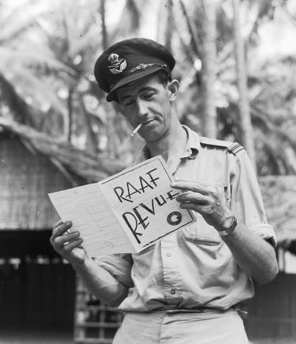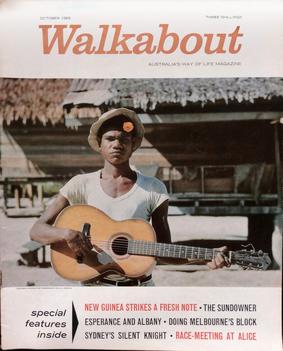Related Research Articles

Jedda, released in the UK as Jedda the Uncivilized, is a 1955 Australian film written, produced and directed by Charles Chauvel. His last film, it is notable for being the first to star two Aboriginal actors, Robert Tudawali and Ngarla Kunoth in the leading roles. It was also the first Australian feature film to be shot in colour.

Charles Edward Chauvel OBE was an Australian filmmaker, producer and screenwriter and nephew of Australian army General Sir Harry Chauvel. He is noted for writing and directing the films Forty Thousand Horsemen in 1940 and Jedda in 1955. His wife, Elsa Chauvel, was a frequent collaborator on his filmmaking projects.

John William Pilbean Goffage MBE, known professionally as Chips Rafferty, was an Australian actor. Called "the living symbol of the typical Australian", Rafferty's career stretched from the late 1930s until he died in 1971, and during this time he performed regularly in major Australian feature films as well as appearing in British and American productions, including The Overlanders and The Sundowners. He appeared in commercials in Britain during the late 1950s, encouraging British emigration to Australia.

In the Wake of the Bounty (1933) is an Australian film directed by Charles Chauvel about the 1789 Mutiny on the Bounty. It is notable as the screen debut of Errol Flynn, playing Fletcher Christian. The film preceded MGM's more famous Mutiny on the Bounty, starring Charles Laughton and Clark Gable, by two years.

Walkabout was an Australian illustrated magazine published from 1934 to 1974 combining cultural, geographic, and scientific content with travel literature. Initially a travel magazine, in its forty-year run it featured a popular mix of articles by travellers, officials, residents, journalists, naturalists, anthropologists and novelists, illustrated by Australian photojournalists. Its title derived "from the supposed 'racial characteristic of the Australian Aboriginal who is always on the move'."
Lee Robinson was an Australian producer, director and screenwriter who was Australia's most prolific filmmaker of the 1950s.

The Siege of Pinchgut is a 1959 British thriller filmed on location in Sydney, Australia, and directed by Harry Watt. It was the last film produced by Ealing Studios, and was entered into the 9th Berlin International Film Festival where it was nominated for the Golden Bear Award.
Tudawali is a 1988 made for television biographical film about Aboriginal Australian actor Robert Tudawali. The screenplay was by Alan Seymour. It was directed by Steve Jodrell, and stars Ernie Dingo in the title role.

Elsa Chauvel, was an Australian filmmaker and actress, and the wife and collaborator of film director Charles Chauvel. Elsa Chauvel was a pioneer in Australian film making, best known for her contributions to films such as Greenhide, In the Wake of the Bounty, and Jedda. Her legacy in Australian film was celebrated with the creation of the Chauvel Award, dedicated to the work of Elsa and Charles Chauvel, which honours Australian excellence in film.
Greenhide is a 1926 Australian film directed by Charles Chauvel. Only part of the film survives.

The Intruders is a 1969 Australian film directed by Lee Robinson. It is a spin-off of the popular Skippy the Bush Kangaroo TV series.
Tasman Higgins was an Australian cinematographer during the early days of the Australian film industry, working for such directors as Charles Chauvel, Raymond Longford, Beaumont Smith, Louise Lovely and Rupert Kathner. He was the brother of Arthur and Ernest Higgins, with whom he occasionally collaborated.
The Dawn Fraser Story is a 1964 documentary film about Australian swimmer Dawn Fraser. It was made by Joy Cavill, who later made a feature film about Fraser, Dawn! (1979), and had a romantic relationship with her. It is one of the few Australian documentary films of the time to be directed by a woman. It was made by the short lived Waratah Film Productions.
Shannon's Mob is an Australian TV series about an Australian intelligence agency. It was the last TV series from Fauna Productions, who were responsible for Skippy the Bush Kangaroo among others.
Namatjira the Painter is a 1947 documentary about the artist, Albert Namatjira. It deals with his background, his relationship with Rex Battarbee and how he learned to paint.
Outback Patrol is a 1952 documentary about the patrol of a policeman in the Northern Territory outback, Constable Robert Darkin, and the various tasks he must perform. The movie has since become a study text in Australian secondary schools. Robinson said it "was a very successful picture."
Crocodile Hunters is a 1949 Australian documentary directed by Lee Robinson about both Aboriginal and professional crocodile hunters in the Northern Territory of Australia. The film has since been used as a study text for Australian secondary schools.
Herc McIntyre was head of Universal Pictures in Australia from 1920 until the 1950s. He was important in the career of Charles Chauvel, helping finance several of his films. He was also friends with Lee Robinson and helped him distribute The Phantom Stockman (1953).
The Big Picture is a documentary film directed by John Doggett-Williams about filmmakers Charles and Elsa Chauvel and their eight feature films made between 1926 and 1955.
Australian Walkabout, billed as a "series of fact features telling the enthralling story of Australia to-day," was broadcast by the Australian Broadcasting Commission for three years beginning on at 9:15 on Thursday, 15 May 1947, on 'Interstate' national stations 2FC and 2NA, and state radio stations 3AR. 4OG. 5CL, and 7ZL. The inaugural broadcast was Moonta, South Australia's "Little Cornwall".
References
- ↑ "TELEVISION PARADE". The Australian Women's Weekly . Vol. 25, no. 26. Australia. 4 December 1957. p. 12. Retrieved 31 March 2014– via National Library of Australia.
- ↑ Robinson, Lee (15 August 1976). "Lee Robinson" (Oral history). Interviewed by Graham Shirley. National Film and Sound Archive.